Re: Stanford School of Medicine – March 21, 2012 – Imaging study reveals differences in brain function for children with math anxiety This study is important reading for anyone interested in understanding the emergence of neuroscience in support of unhealthy learning, maladaptive schema, and Mind-Shame. Absent from the article are two critical distinctions: 1) Math Anxiety is a form […]
Search results for "shame learning"
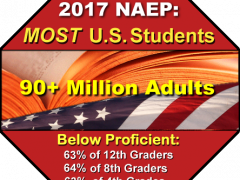
Children of the Code: Phase 2
Thank you for continuing on with us… Whatever drives your interest in reading, whether you want to help a struggling reader, or champion dyslexia legislation; whether you’re a teacher, parent, educational leader, or an activist, the bottleneck to your progress is always learning. For every child and adult who struggles and for all of us as a society, ‘reading […]
Share this:
- Click to share on Facebook (Opens in new window)
- Click to share on Twitter (Opens in new window)
- Click to share on LinkedIn (Opens in new window)
- Click to share on Pinterest (Opens in new window)
- Click to share on Pocket (Opens in new window)
- Click to share on Reddit (Opens in new window)
- Click to share on Telegram (Opens in new window)
- Click to share on Tumblr (Opens in new window)
- Click to share on WhatsApp (Opens in new window)
- Click to email a link to a friend (Opens in new window)
- Click to print (Opens in new window)
Re: The Link Between Reading Level and Dropout Rates
Re: New York Times: The Link Between Reading Level and Dropout Rates 3-19-2012 “Children who aren’t reading proficiently by fourth grade are four times more likely to drop out of high school, and according to the National Assessment of Educational Progress, only 34 percent of America’s fourth graders read at grade level.” It’s always good to […]
Share this:
- Click to share on Facebook (Opens in new window)
- Click to share on Twitter (Opens in new window)
- Click to share on LinkedIn (Opens in new window)
- Click to share on Pinterest (Opens in new window)
- Click to share on Pocket (Opens in new window)
- Click to share on Reddit (Opens in new window)
- Click to share on Telegram (Opens in new window)
- Click to share on Tumblr (Opens in new window)
- Click to share on WhatsApp (Opens in new window)
- Click to email a link to a friend (Opens in new window)
- Click to print (Opens in new window)
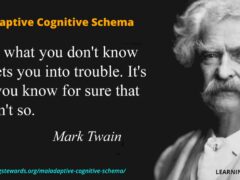
Maladaptive Cognitive Schema
Maladaptive Cognitive Schema is learning (noun) that organizes our knowledge, assumptions, and mental processing habits, in ways that misorient, misdirect, misinform, or otherwise undermine or disable learning (verb). Maladaptive adj. 1. Marked by faulty or inadequate adaptation. 2. Not assisting or promoting adaptation. Cognitive Schema Structures that organize our knowledge and assumptions about something and are used […]
Share this:
- Click to share on Facebook (Opens in new window)
- Click to share on Twitter (Opens in new window)
- Click to share on LinkedIn (Opens in new window)
- Click to share on Pinterest (Opens in new window)
- Click to share on Pocket (Opens in new window)
- Click to share on Reddit (Opens in new window)
- Click to share on Telegram (Opens in new window)
- Click to share on Tumblr (Opens in new window)
- Click to share on WhatsApp (Opens in new window)
- Click to email a link to a friend (Opens in new window)
- Click to print (Opens in new window)
cna yuo raed tihs
cna yuo raed tihs? “Aoccdrnig to a rscheearch at Cmabrigde Uinervtisy, it deosn’t mttaer in waht oredr the ltteers in a wrod are, the olny iprmoatnt tihng is taht the frist and lsat ltteers be at the rghit pclae. The rset can be a toatl mses and you can sitll raed it wouthit porbelm. Tihs […]
Share this:
- Click to share on Facebook (Opens in new window)
- Click to share on Twitter (Opens in new window)
- Click to share on LinkedIn (Opens in new window)
- Click to share on Pinterest (Opens in new window)
- Click to share on Pocket (Opens in new window)
- Click to share on Reddit (Opens in new window)
- Click to share on Telegram (Opens in new window)
- Click to share on Tumblr (Opens in new window)
- Click to share on WhatsApp (Opens in new window)
- Click to email a link to a friend (Opens in new window)
- Click to print (Opens in new window)
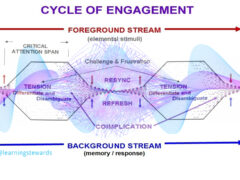
Cycle of Engagement
Learning occurs in the field of attention (not necessarily the same as concentration or even conscious awareness). Learning is a process of connecting, integrating, and incorporating new experiences. Learning involves co-implicating new interrelationships between the memory of previous experiences and the living ‘edge of now’ being experienced (attention-differentiation-disambiguation). As sensory and cognitive processes provide foreground […]
Share this:
- Click to share on Facebook (Opens in new window)
- Click to share on Twitter (Opens in new window)
- Click to share on LinkedIn (Opens in new window)
- Click to share on Pinterest (Opens in new window)
- Click to share on Pocket (Opens in new window)
- Click to share on Reddit (Opens in new window)
- Click to share on Telegram (Opens in new window)
- Click to share on Tumblr (Opens in new window)
- Click to share on WhatsApp (Opens in new window)
- Click to email a link to a friend (Opens in new window)
- Click to print (Opens in new window)
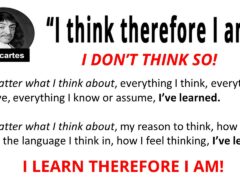
“I” am Learned
Biologically adapted to be adaptive, we are neurologically plastic – we are, constitutionally, learning oriented beings. Can you remember yourself as a child? Try to remember yourself as far back as you can. What’s the difference between the ‘you’ you just remembered and the ‘you’ doing the remembering? Have ‘you’ changed at all? How did you become […]
Share this:
- Click to share on Facebook (Opens in new window)
- Click to share on Twitter (Opens in new window)
- Click to share on LinkedIn (Opens in new window)
- Click to share on Pinterest (Opens in new window)
- Click to share on Pocket (Opens in new window)
- Click to share on Reddit (Opens in new window)
- Click to share on Telegram (Opens in new window)
- Click to share on Tumblr (Opens in new window)
- Click to share on WhatsApp (Opens in new window)
- Click to email a link to a friend (Opens in new window)
- Click to print (Opens in new window)
Re: Discovering How to Learn Smarter
Re: Discovering How to Learn Smarter http://mindshift.kqed.org/2012/02/discovering-how-to-learn-smarter/ Responded on two levels: 1) re: self-esteem: There is a difference between self-esteem as accumulated positivity and self-esteem as a buoyant absence of self-negativity. Of the two major domains of unhealthy learning, maladaptive cognitive schema and unconscious emotional aversions, the later, and in particular ‘mind-shame’, is largely the result of learned self-disesteem. 2) learning about the […]
Share this:
- Click to share on Facebook (Opens in new window)
- Click to share on Twitter (Opens in new window)
- Click to share on LinkedIn (Opens in new window)
- Click to share on Pinterest (Opens in new window)
- Click to share on Pocket (Opens in new window)
- Click to share on Reddit (Opens in new window)
- Click to share on Telegram (Opens in new window)
- Click to share on Tumblr (Opens in new window)
- Click to share on WhatsApp (Opens in new window)
- Click to email a link to a friend (Opens in new window)
- Click to print (Opens in new window)
Key Memes
Learning – “I” Am Learned – “We” Are Learned The Challenge of Change – Evolutionarily Transformative Unhealthy Learning – Maladaptive Cognitive Schema – Mind-Shame Natural Learning Artificial Learning – What is Reading? – The Brain’s Challenge: Processing Stutters – Processing Speed Stewarding Healthy Learning Redefining Learning […]
Share this:
- Click to share on Facebook (Opens in new window)
- Click to share on Twitter (Opens in new window)
- Click to share on LinkedIn (Opens in new window)
- Click to share on Pinterest (Opens in new window)
- Click to share on Pocket (Opens in new window)
- Click to share on Reddit (Opens in new window)
- Click to share on Telegram (Opens in new window)
- Click to share on Tumblr (Opens in new window)
- Click to share on WhatsApp (Opens in new window)
- Click to email a link to a friend (Opens in new window)
- Click to print (Opens in new window)
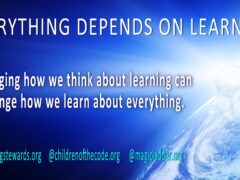
Home
Everything Depends on Learning. The Central Dynamic of Being HumanLearning is not just one of the things we do. Everything we do, in every of moment life, involves learning; every movement we move, every emotion we feel, every thought we think, every word we speak, and every belief we believe. Babies learn to become children, children learn to become teens, […]
Share this:
- Click to share on Facebook (Opens in new window)
- Click to share on Twitter (Opens in new window)
- Click to share on LinkedIn (Opens in new window)
- Click to share on Pinterest (Opens in new window)
- Click to share on Pocket (Opens in new window)
- Click to share on Reddit (Opens in new window)
- Click to share on Telegram (Opens in new window)
- Click to share on Tumblr (Opens in new window)
- Click to share on WhatsApp (Opens in new window)
- Click to email a link to a friend (Opens in new window)
- Click to print (Opens in new window)
